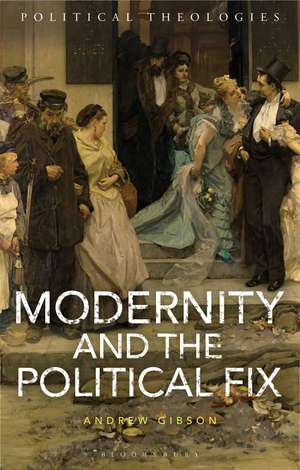Modernity and the Political Fix: Political Theologies
Autor Professor Andrew Gibsonen Limba Engleză Paperback – 28 oct 2020
| Toate formatele și edițiile | Preț | Express |
|---|---|---|
| Paperback (1) | 224.29 lei 6-8 săpt. | |
| Bloomsbury Publishing – 28 oct 2020 | 224.29 lei 6-8 săpt. | |
| Hardback (1) | 656.06 lei 6-8 săpt. | |
| Bloomsbury Publishing – 17 apr 2019 | 656.06 lei 6-8 săpt. |
Preț: 224.29 lei
Preț vechi: 288.65 lei
-22% Nou
Puncte Express: 336
Preț estimativ în valută:
42.92€ • 46.77$ • 36.16£
42.92€ • 46.77$ • 36.16£
Carte tipărită la comandă
Livrare economică 23 aprilie-07 mai
Preluare comenzi: 021 569.72.76
Specificații
ISBN-13: 9781350212541
ISBN-10: 1350212547
Pagini: 248
Dimensiuni: 156 x 234 mm
Greutate: 0.35 kg
Editura: Bloomsbury Publishing
Colecția Bloomsbury Academic
Seria Political Theologies
Locul publicării:London, United Kingdom
ISBN-10: 1350212547
Pagini: 248
Dimensiuni: 156 x 234 mm
Greutate: 0.35 kg
Editura: Bloomsbury Publishing
Colecția Bloomsbury Academic
Seria Political Theologies
Locul publicării:London, United Kingdom
Caracteristici
Andrew Gibson has a significant reputation as a prominent critic of literary and philosophical writing
Notă biografică
Andrew Gibson was Research Professor of Modern Literature and Theory at Royal Holloway, University of London, UK, where he still teaches part-time. He is currently Visiting Professor at the J.M. Coetzee Centre at the University of Adelaide, Australia, and was until recently a member of the Conseil Scientifique of the Collège Internationale de Philosophie in Paris. His many books include Intermittency: The Concept of Historical Reason in Contemporary French Philosophy (2012) and Misanthropy (Bloomsbury, 2017).
Cuprins
Introduction: Modernity and the Political Fix1 The Implosion of Modernity2 Absolute Historicity3 Event4 Remainder5 The People Untransformed6 TransmissionConclusion: A Political Theology
Recenzii
It is to be recommended for its expansiveness, generosity and singular orientation ... A unique and insightful work. Its central theses deserve to be respected.
For those looking to better understand the specificity of our current 'political predicament' ... a bounty of riches awaits.
Heeding vast amounts of historical, literary and conceptual work, Gibson weaves a compelling narrative that enlists thinking modalities from a wide variety of genres. What is especially important about Gibson's framing of the investigation is that in turning to the idea of "ironical modernity" the book challenges Richard Rorty's stultifying assertion that irony is alien to political commitment. Politics and irony are intimately interconnected for Gibson, precisely because he embraces a politics that accepts historical contingency as much as it does the contingencies of subjectivity. Crucially Gibson embraces a political theology that is yet to come. He focuses on how we can enrich our political grasp of modernity to elaborate a theologically-influenced conception of historical or human time "without finality."
Andrew Gibson's is a very significant book - a cultural intervention in the Nietzschean vein and, at times, manner. Paradoxically, it proposes a political theology that is resolutely secular, but justifies its resort to the materials of theology; in other words, it finesses the commonplace argument that modern political thought is necessarily if unwittingly and, in defiance of its own resolutions to the contrary, theological. It is a profound and passionate meditation on modernism - its achievements as well as its discontents - and I recommend it without reservation.
For those looking to better understand the specificity of our current 'political predicament' ... a bounty of riches awaits.
Heeding vast amounts of historical, literary and conceptual work, Gibson weaves a compelling narrative that enlists thinking modalities from a wide variety of genres. What is especially important about Gibson's framing of the investigation is that in turning to the idea of "ironical modernity" the book challenges Richard Rorty's stultifying assertion that irony is alien to political commitment. Politics and irony are intimately interconnected for Gibson, precisely because he embraces a politics that accepts historical contingency as much as it does the contingencies of subjectivity. Crucially Gibson embraces a political theology that is yet to come. He focuses on how we can enrich our political grasp of modernity to elaborate a theologically-influenced conception of historical or human time "without finality."
Andrew Gibson's is a very significant book - a cultural intervention in the Nietzschean vein and, at times, manner. Paradoxically, it proposes a political theology that is resolutely secular, but justifies its resort to the materials of theology; in other words, it finesses the commonplace argument that modern political thought is necessarily if unwittingly and, in defiance of its own resolutions to the contrary, theological. It is a profound and passionate meditation on modernism - its achievements as well as its discontents - and I recommend it without reservation.









